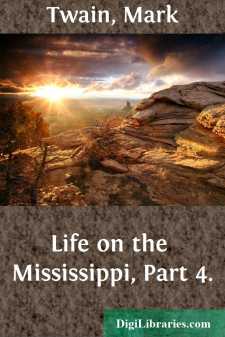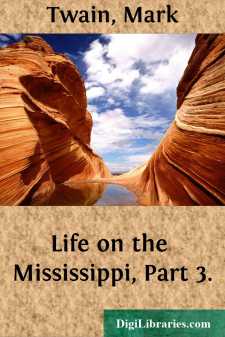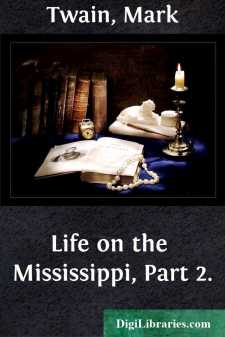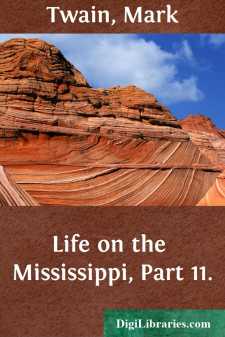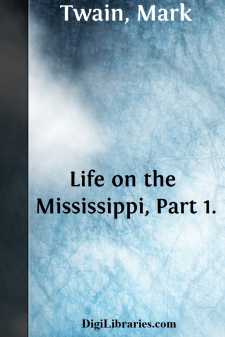Biography & Autobiography
- Adventurers & Explorers 15
- Artists, Architects, Photographers 16
- Business 2
- Composers & Musicians 14
- Criminals & Outlaws 5
- Editors, Journalists, Publishers 6
- Educators 1
- Entertainment & Performing Arts 3
- General 73
- Health, Exercise & Fitness 1
- Historians 3
- Historical 83
- Law Enforcement 1
- Lawyers & Judges 3
- Literary
- Medical 7
- Military 48
- Naturalists, Gardeners, Environmentalists 8
- Personal Memoirs & Diaries 226
- Philosophers 3
- Political 9
- Presidents & Heads of State 38
- Religious 38
- Rich & Famous 27
- Scientists 13
- Women 31
Literary Books
Sort by:
by:
Mark Twain
Chapter 16 Racing Days IT was always the custom for the boats to leave New Orleans between four and five o'clock in the afternoon. From three o'clock onward they would be burning rosin and pitch pine (the sign of preparation), and so one had the picturesque spectacle of a rank, some two or three miles long, of tall, ascending columns of coal-black smoke; a colonnade which supported a sable...
more...
by:
Mark Twain
The River Rises DURING this big rise these small-fry craft were an intolerable nuisance. We were running chute after chute,—a new world to me,—and if there was a particularly cramped place in a chute, we would be pretty sure to meet a broad-horn there; and if he failed to be there, we would find him in a still worse locality, namely, the head of the chute, on the shoal water. And then there would...
more...
by:
Mark Twain
Chapter 6 A Cub-pilot's Experience WHAT with lying on the rocks four days at Louisville, and some other delays, the poor old 'Paul Jones' fooled away about two weeks in making the voyage from Cincinnati to New Orleans. This gave me a chance to get acquainted with one of the pilots, and he taught me how to steer the boat, and thus made the fascination of river life more potent than ever...
more...
by:
Mark Twain
A Question of Law THE slaughter-house is gone from the mouth of Bear Creek and so is the small jail (or 'calaboose') which once stood in its neighborhood. A citizen asked, 'Do you remember when Jimmy Finn, the town drunkard, was burned to death in the calaboose?' Observe, now, how history becomes defiled, through lapse of time and the help of the bad memories of men. Jimmy Finn was...
more...
by:
Mark Twain
Chapter 51 Reminiscences WE left for St. Louis in the 'City of Baton Rouge,' on a delightfully hot day, but with the main purpose of my visit but lamely accomplished. I had hoped to hunt up and talk with a hundred steamboatmen, but got so pleasantly involved in the social life of the town that I got nothing more than mere five-minute talks with a couple of dozen of the craft. I was on the...
more...
by:
Mark Twain
Chapter 46 Enchantments and Enchanters THE largest annual event in New Orleans is a something which we arrived too late to sample—the Mardi-Gras festivities. I saw the procession of the Mystic Crew of Comus there, twenty-four years ago—with knights and nobles and so on, clothed in silken and golden Paris-made gorgeousnesses, planned and bought for that single night's use; and in their train...
more...
by:
Mark Twain
THE Mississippi is well worth reading about. It is not a commonplace river, but on the contrary is in all ways remarkable. Considering the Missouri its main branch, it is the longest river in the world—four thousand three hundred miles. It seems safe to say that it is also the crookedest river in the world, since in one part of its journey it uses up one thousand three hundred miles to cover the same...
more...
by:
William Sharp
CHAPTER I. It must, to admirers of Browning's writings, appear singularly appropriate that so cosmopolitan a poet was born in London. It would seem as though something of that mighty complex life, so confusedly petty to the narrow vision, so grandiose and even majestic to the larger ken, had blent with his being from the first. What fitter birthplace for the poet whom a comrade has called the...
more...
by:
Thomas Moore
LETTER 508. TO MR. MOORE. "Genoa, February 20. 1823. "My Dear Tom, "I must again refer you to those two letters addressed to you at Passy before I read your speech in Galignani, &c., and which you do not seem to have received.[1] [Footnote 1: I was never lucky enough to recover these two letters, though frequent enquiries were made about them at the French post-office.] "Of Hunt...
more...
LETTER 394. TO MR. MOORE. "Ravenna, October 17. 1820. "You owe me two letters—pay them. I want to know what you are about. The summer is over, and you will be back to Paris. Apropos of Paris, it was not Sophia Gail, but Sophia Gay—the English word Gay—who was my correspondent. Can you tell who she is, as you did of the defunct * *? "Have you gone on with your Poem? I have received the...
more...


